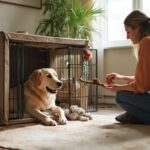To help your dog become confident and well-rounded, start socializing early, ideally between 3 to 14 weeks. Gradually expose them to new environments, allowing them to acclimate at their own pace. Use positive reinforcement to reward good behavior and establish trust. Structured playdates with other dogs can enhance social skills, while socialization classes provide guided interactions. Regular outings to various locations will enrich their experiences. Ultimately, help them adapt to different sounds and sights gradually, reinforcing calmness. These strategies are just a start—exploring deeper insights can further enhance your dog's socialization journey.
Start Early With Puppies

Socialization is pivotal for puppies, and starting early sets the foundation for a well-adjusted adult dog. When you bring your puppy home, you've got a limited window—typically between 3 to 14 weeks—where their experiences will shape their future behavior. You need to expose your puppy to a variety of people, animals, and environments during this critical period.
Begin by inviting friends and family over to meet your puppy. Encourage gentle interactions, allowing your pup to explore different scents and sounds. You can also take your puppy to safe, controlled environments—like puppy classes or pet-friendly parks—where they can socialize with other dogs.
Remember, positive experiences are key. Always monitor interactions to ascertain your puppy feels comfortable. If your puppy seems overwhelmed, give them a break and try again later.
Incorporating different textures, sounds, and sights into their daily routine will also help. Introduce them to various surfaces, from grass to concrete, and play sounds like doorbells or vacuum cleaners. By starting early, you're equipping your puppy with the confidence and skills they need to tackle the world with ease.
Gradual Exposure to New Environments
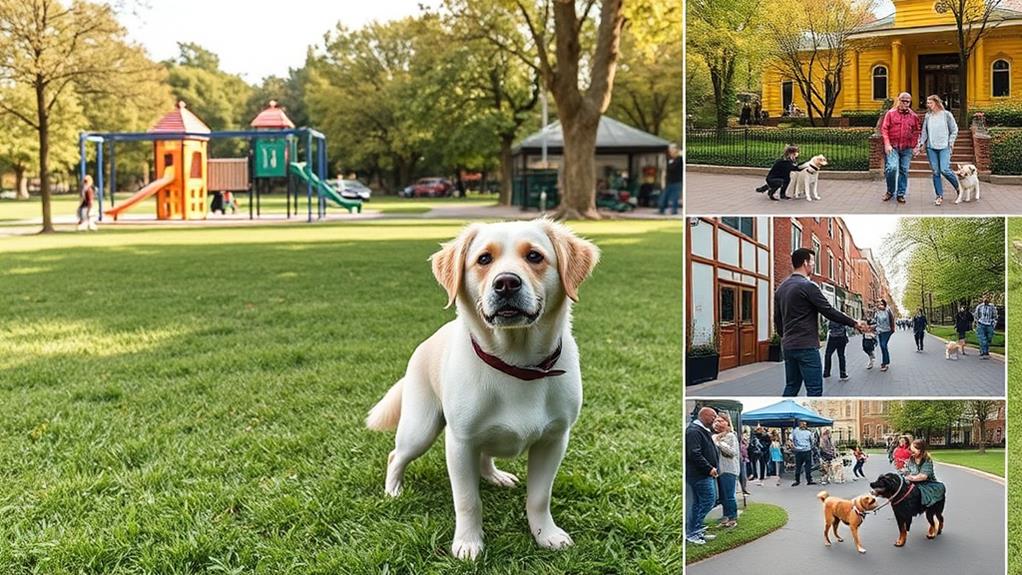
After laying the groundwork with early socialization, it's crucial to gradually introduce your puppy to new environments. Start with familiar settings, like your backyard or a quiet park, and slowly expose them to different sights, sounds, and smells. This helps your puppy build confidence without feeling overwhelmed.
Once your puppy seems comfortable in those initial spaces, gradually increase the level of exposure. Take short trips to busier parks, pet-friendly stores, or friend's homes. Monitor your puppy's reactions closely; if they seem anxious or stressed, take a step back and allow them to acclimate at their own pace.
Remember to incorporate various environments, like urban areas, rural settings, and even different weather conditions. It's vital to vary the settings to help your puppy adapt to diverse situations. Encourage exploration by letting them sniff around and engage with their surroundings, but don't force interactions.
Keep each experience positive, and as your puppy becomes more confident, you can increase the complexity of the environments you explore together. This gradual exposure will help your puppy grow into a well-rounded dog who can confidently navigate the world around them.
Positive Reinforcement Techniques

Positive reinforcement techniques are essential for shaping your dog's behavior and fostering a strong bond between you two. By rewarding your dog for desired behaviors, you're encouraging them to repeat those actions. This approach builds trust and confidence, making socialization a more enjoyable experience for both of you.
Start by identifying the behaviors you want to reinforce. When your dog responds positively, immediately offer a reward—this could be treats, praise, or playtime. Timing is important; rewards should come right after the desired behavior to help your dog make the connection.
Next, ensure your rewards are motivating for your dog. Some dogs prefer high-value treats, while others might respond better to enthusiastic praise or a favorite toy. Experiment to find what works best. Consistency is key; always reward the behavior you want to encourage.
Additionally, gradually increase the challenge level as your dog becomes more confident. If they're comfortable with certain situations, reward them for remaining calm in more stimulating environments. This reinforces their positive experiences and helps them adapt to new social situations effectively. With patience and practice, positive reinforcement will create a well-rounded, confident companion.
Structured Playdates With Other Dogs
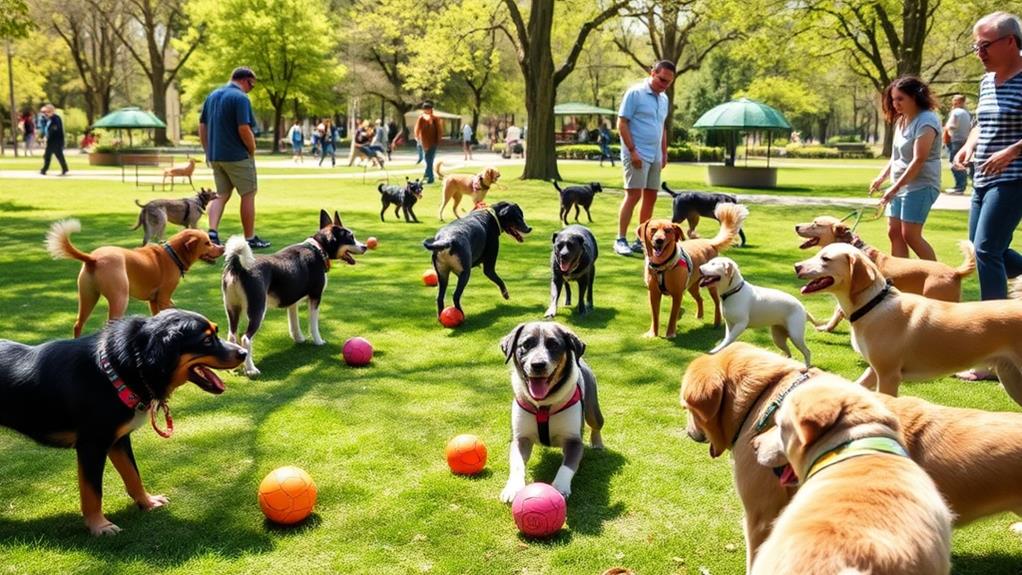
When planning structured playdates with other dogs, creating a safe and controlled environment is key. Start by selecting a neutral space where neither dog feels territorial. This can help reduce any potential stress or aggressive behavior.
Guarantee both dogs are up to date on vaccinations and are well-socialized, as this promotes a positive interaction.
Introduce the dogs gradually, allowing them to sniff each other while on leashes. Observe their body language closely—look for relaxed postures and wagging tails as indicators of comfort. If either dog shows signs of anxiety or aggression, be ready to intervene and separate them if necessary.
Keep the playdate structured by setting specific times for play and breaks. This helps prevent overstimulation and allows both dogs to recharge. Use toys and treats to encourage positive behaviors and reinforce good manners during play.
Socialization Classes and Training
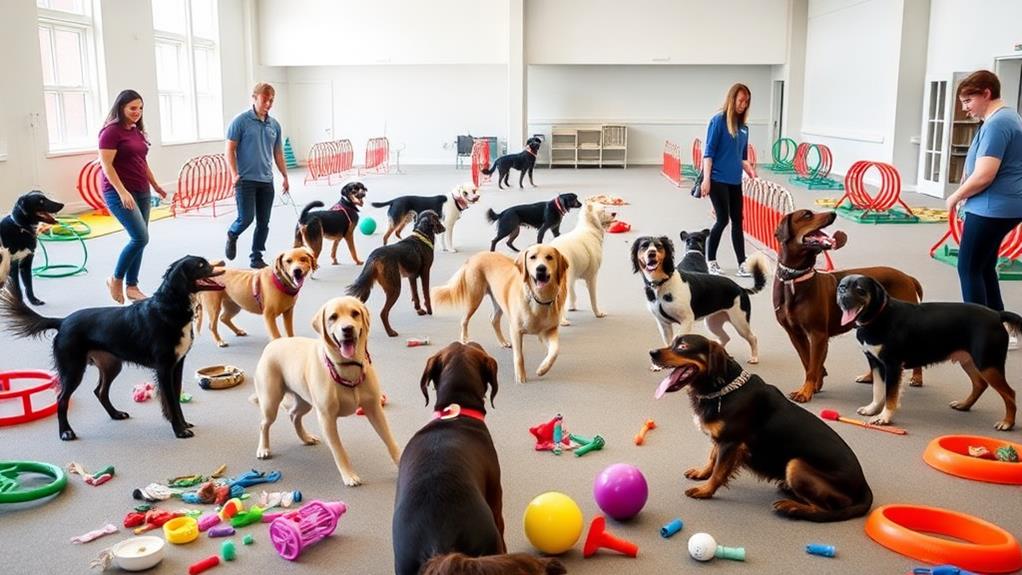
Enrolling your dog in socialization classes can greatly enhance their interaction skills and overall behavior. These classes provide structured environments where your dog can meet other dogs and people, which is vital for developing confidence and social skills. Experienced trainers guide the sessions, helping you address any specific concerns your dog may have, like fear or aggression.
In these classes, your dog will learn how to behave appropriately in various situations, such as waiting their turn, responding to commands, and interacting positively with other pets. Additionally, you'll gain valuable insights into your dog's behavior, learning how to read their body language and understand their needs better.
It's important to choose a class that matches your dog's age and temperament. Puppy classes focus on pivotal early socialization, while adult classes can help reintroduce or reinforce good habits. Most importantly, regular attendance will help your dog build positive associations with new experiences.
Socialization classes not only strengthen your bond with your pet but also equip them with essential life skills. In the long run, this investment can lead to a happier, more well-adjusted dog, making outings and daily life much more enjoyable for both of you.
Exploring Various Sounds and Sights
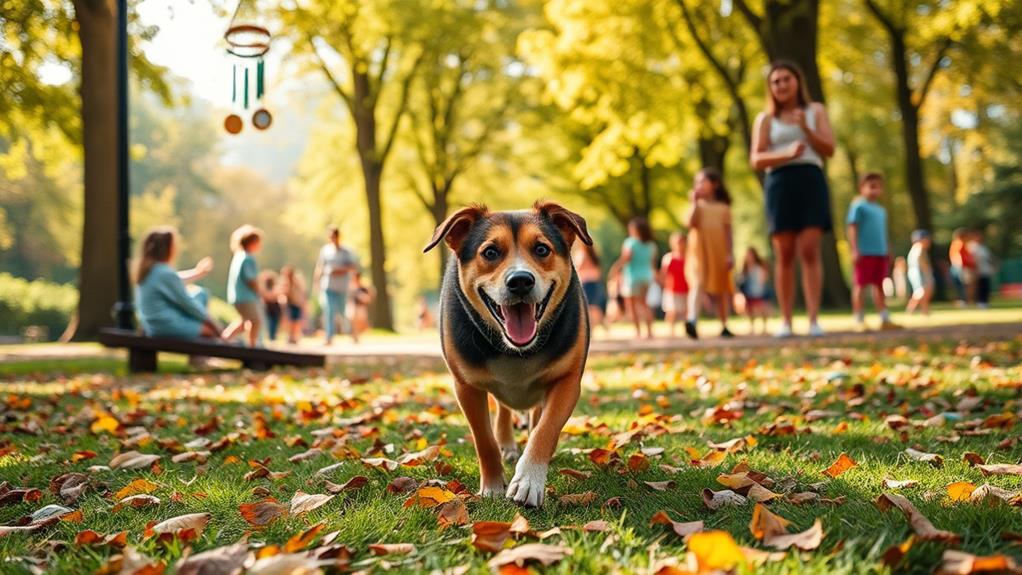
Introducing your dog to various sounds and sights is essential for building their confidence and adaptability. This exposure helps your dog become comfortable in a variety of environments, reducing fear and anxiety. Start by gradually introducing your dog to different stimuli, ensuring each experience is positive and rewarding.
Here's a handy table to help you understand different sounds and sights to explore with your dog:
| Sound/Sight | Description | Recommended Approach |
|---|---|---|
| Thunder | Loud, booming noise | Use treats, play calming music |
| Sirens | High-pitched emergency sounds | Gradual exposure, praise when calm |
| Busy streets | Traffic and crowds | Short visits, keep distance |
| Children playing | Laughter and loud noises | Observe from afar, reward calm behavior |
| Animals (birds, etc.) | Various wildlife sounds | Controlled introductions, positive reinforcement |
Regular Outings to Different Locations

Regular outings to different locations are essential for your dog's socialization and overall well-being. These excursions expose your pup to a variety of environments, helping them become more adaptable and confident. Whether it's a park, a pet-friendly café, or a bustling street, each new place offers unique sights, sounds, and smells that enrich your dog's experiences.
Make it a habit to regularly take your dog to different locations. Start with quieter spots and gradually introduce busier areas as they become more comfortable. This will help your dog learn how to navigate various situations without becoming overwhelmed. Always observe their body language; if they seem anxious, give them a break or retreat to a quieter space.
Engaging in regular outings also provides you with opportunities to practice training commands in distracting environments. This reinforces their training and strengthens your bond. Plus, socializing with other dogs and people helps your pup develop essential social skills.
Frequently Asked Questions
How Long Should Socialization Sessions Last for Puppies?
Socialization sessions for puppies should last about 5 to 15 minutes, depending on their age and energy levels. Keep it fun and engaging, and gradually increase the duration as they become more comfortable and confident.
What Age Is Too Late for Dog Socialization?
Research shows 80% of a dog's personality is shaped by six months old. While it's ideal to socialize before this age, you can still foster positive experiences later; just be patient and consistent with your approach.
Can Socialization Help With Anxiety in Adult Dogs?
Yes, socialization can help reduce anxiety in adult dogs. By exposing them to new experiences and environments, you'll boost their confidence and comfort levels, making them feel more secure and relaxed in various situations.
How Do I Recognize Signs of Stress in My Dog During Socialization?
Many people think dogs hide stress well, but you can spot signs like panting, avoiding eye contact, or tail tucking. Pay attention to these cues to guarantee your dog feels safe and comfortable.
What Should I Do if My Dog Reacts Negatively to New Experiences?
If your dog reacts negatively to new experiences, stay calm and remove them from the situation. Give them space, and gradually reintroduce the experience at a comfortable pace, rewarding positive behavior along the way.
Conclusion
By starting early, exposing your dog gradually, and using positive reinforcement, you'll build a confident companion. Structured playdates and socialization classes foster friendships, while exploring diverse sounds and sights encourages adaptability. Regular outings to new locations guarantee your dog remains well-rounded and sociable. Embrace these strategies, and you'll not only enhance your dog's social skills but also deepen your bond. Remember, a happy, confident dog is a joy to have by your side!


